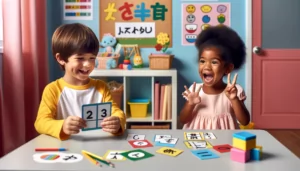Japanese language and culture are rich and diverse, offering more than just formal phrases and traditions. For those looking to dive deeper into everyday conversation and understand the language spoken by Japanese youth, Japanese slang words provide a colorful and dynamic window into the vibrant world of casual expressions. In this article, we’ll explore ten Japanese slang words, describing each word or expression in detail and providing examples to help you grasp their meanings and usage.

✅ AI Essay Writer ✅ AI Detector ✅ Plagchecker ✅ Paraphraser
✅ Summarizer ✅ Citation Generator
Japanese Slang Words: An Overview
Japanese slang, often referred to as “genki-go” or “casual language,” adds a layer of informality and character to the language. Let’s delve into these expressions one by one, starting with the basics.
1. Kawaii: Cute, Pretty, Adorable
Kawaii (可愛い) is a ubiquitous term in Japanese slang, meaning “cute,” “pretty,” or “adorable.” It’s a versatile word that can be used for both people and objects. Here’s an example:
Example: 今日の服、かわいいね (Kyou no fuku kawaii ne). Your clothes today look good.
2. Kimoi: Disgusting, Gross
Kimoi (キモい) is the opposite of kawaii and means “disgusting” or “gross.” It’s a straightforward expression for expressing strong negative feelings.
Example: うわっ、キモい! (Uwa, kimoi!). Eww, gross!
3. Uzai: Annoying, Irritating
Uzai (ウザい) is used to describe something or someone annoying or bothersome. It’s a versatile term that can be applied in various situations.
Example: 彼って本当にウザいね (Karette hontou ni uzai ne). He is really annoying.
4. Mukatsuku: Pissed Off
Mukatsuku (ムカつく) expresses being upset or annoyed at someone or something. It’s a step beyond being annoyed; it’s when you’re genuinely irritated.
Example: あの男、本当にムカつく! (Ano otoko, hontou ni mukatsuku!). I’m pissed off with that man over there!
5. Sugoi: Awesome, Terrific, Very
Sugoi (すごい) is a common word used to express amazement or admiration. It’s a versatile word used both positively and negatively.
Example 1: 合格したの?すごい!おめでとう (Goukaku shitano? Sugoi! Omedetou). You passed the test? That’s awesome. Congratulations!
Example 2: すごい目でにらまれた (Sugoi me de niramareta). I was being stared at by horrific eyes.
6. Maji: Seriously
Maji (マジ) is used to express surprise, similar to saying “seriously” or “really?” It’s popular among youngsters but may not be suitable for formal situations.
Example: けいこさんとジョージが付き合ったらしいよ。マジで? (Keiko-san to Jooji ga tsukiatta rashii yo. Maji de?). I’ve heard that Keiko and George got together. Seriously?
7. Yabai: Oh My Gosh, Wow
Yabai (ヤバい) can convey amazement or concern. It’s used in both positive and negative contexts, making it a versatile expression.
Example 1: あの人、ヤバい、かっこいい (Ano hito yabai kakkoii). Wow, that man over there is hot.
Example 2: ヤバい、携帯が壊れた (Yabai keitai ga kowareta). Oh my gosh, my mobile is broken.
8. Choo/Meccha: So, Super
Choo (超) and meccha (めっちゃ) are used for emphasis. They can be added before adjectives to intensify their meaning.
Example: ラーメンが超食べたい (Raamen ga choo-tabetai). I so want to eat ramen.
9. Ukeru: Hilarious, Epic
Ukeru (ウケる) is used when something is funny or hilarious. It’s a common word among young people.
Example: 彼の髪型、超ウケる (Kare no kamigata choo-ukeru). His hairstyle is hilarious.
10. Bimyoo: Yes and No, Not Sure
Bimyoo (ビミョー) is a slang term derived from the word bimyoo (微妙), which means “unclear” or “iffy.” It’s used when you’re unsure or can’t make up your mind.
Example: 彼女、かわいいよね。うーん。ビミョーかな (Kanojo kawaii yone. Uun. Bimyoo kana). She is pretty, isn’t she? Hm. I’m not sure.
Conclusion
Japanese slang adds a unique dimension to the language, allowing speakers to convey informal emotions and reactions. These ten slang words, from kawaii to bimyoo, provide a glimpse into the diverse and colorful world of Japanese casual expressions. While these words can be fun and engaging, it’s essential to use them appropriately and consider the context, especially when speaking with people older than you. Embrace the richness of Japanese language and culture by exploring the world of slang and casual expressions.
FAQ
Follow us on Reddit for more insights and updates.





Comments (0)
Welcome to A*Help comments!
We’re all about debate and discussion at A*Help.
We value the diverse opinions of users, so you may find points of view that you don’t agree with. And that’s cool. However, there are certain things we’re not OK with: attempts to manipulate our data in any way, for example, or the posting of discriminative, offensive, hateful, or disparaging material.